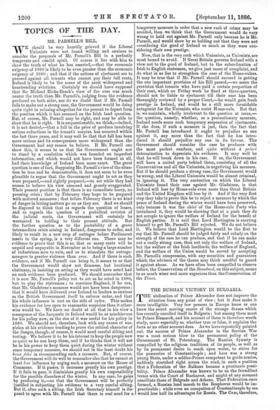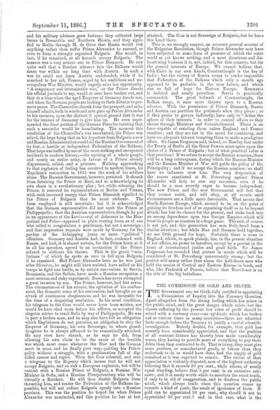THE RUSSIAN VICTORY IN BULGARIA.
THE abdication of Prince Alexander does not improve the situation from any point of view ; but it does make it more intelligible. Very few persons in Europe know or can know the secret moving causes of the strange drama which has recently unrolled itself in Bulgaria ; but among them must be Prince Bismarck, and his account of them is therefore worth study, more especially as, whether true or false, it explains the facts as no other account does. As we have repeatedly pointed out, the success of Prince Alexander in the Servian War was a most serious blow to the permanent policy of the Government of St. Petersburg. The Russian dynasty is compelled by the religious traditions of its people, as well as by 'its permanent desire to reach open water, to strive for the possession of Constantinople ; and here was a strong young State, under a soldier-Prince competent to guide armies, suddenly stretched right across the road, in such a position that a Federation of the Balkans became a proximate possi- bility. Prince Alexander was known to be on the friendliest terms with the Court of Bucharest, and might at any moment conciliate those of Belgrade and Athens. That Federation once formed, a Russian land march to the Bosphorus would be im- practicable ; while even an occupation of Constantinople by sea would lose half its advantages for Russia. The Czar, therefore, and his military advisers grew furious ; they collected large forces in Bessarabia and Southern Russia, and they signi- fied to Berlin through M. de Giers that Russia would risk anything rather than suffer Prince Alexander to succeed, or even to form a strongly organised Bulgaria. She would, in fact, if he remained, at all hazards occupy Bulgaria. The menace was a very serious one to Prince Bismarck. He saw quite well that a Russian advance into the Balkans would mean war within no long time with Austria. In such a war he could not leave Austria undefended, while if he marched to her aid, France, urged by her ambitious and un- scrupulous War Minister, would eagerly seize her opportunity. "A sanguinary and interminable war," as the Prince directs his official journals to say, would at once have broken out, and that at a time when the aged Emperor of Germany dreads war, and when the German people are looking to their dictator to pre- serve peace. The Chancellor shrank from the prospect, and as he. himself admits, both in words and acts, gave up Prince Alexander to his enemies, upon the distinct if cynical ground that it was for the interest of Germany to give him up. He even repri- manded the freer portion of the German Press for insisting that such a surrender would be humiliating. The moment this resolution of the Chancellor's was ascertained, the Prince was seized, the hope being that on his departure from Bulgaria a new . and Russian Administration would rid the Russian Government of its fear, a hostile or independent Federation of the Balkans. That hope was baffled by one of the most striking and unexpected incidents in modern history,—the uprising of a whole people, and nearly an entire army, in favour of a Prince already dispossessed, exiled, and a prisoner. Nothing approaching to that explosion of feeling has occurred in modern times, for Napoleon's restoration in 1815 was the work of his soldiers alone. The Russian Government, however, persisted. It shrank from detaining the Prince at Reni, and so acknowledging its own share in a revolutionary plan ; but while releasing the Prince, it renewed its representations at Berlin and Vienna, with such increased energy that Prince Bismarck signified to the Prince of Bulgaria that he must abdicate. The form employed is still uncertain ; but it is acknowledged that the German representative did not meet the Prince at Philippopolis ; that the Austrian representative, though he put in an appearance at the Levea—out of deference to the Hun- garians and Poles—appeared in plain evening dress, as of one who called to congratulate a gentleman, but not a sovereign ; and that imperative requests were made by Germany far the pardon of the kidnapping junta as mere "political " offenders. Germany and Austria had, in fact, coalesced with Russia, and had, it is almost certain, for the Prince hints at it in all his speeches, agreed to an occupation if the Prince refused to abdicate his throne. That is the grave " mis- fortune " of which he spoke as sure to fall upon Bulgaria if he remained. Had Prince Alexander been as he was just after Slivnitza, he might still have resisted, have called on his troops to fight one battle, or by certain concessions to Servia, Roumania, and the Sultan, have made a Russian occupation a most onerous and risky experiment. Russia has never attempted a great invasion by sea. The Prince, however, had lost nerve. The circumstances of his seizure, the agitation of his confine- ment, the dramatic scene of his restoration, had brought on an attack of continuous sleeplessness, and he was incapable for the time of a despairing resolution. In his usual condition, his telegram to the Czar would never have been written, nor would he have shed tears before his officers, or accepted the singular advice to reach Sofia by way of Philippopolis. He was in part a broken man, and he may also have felt an obligation which Englishmen do not perceive, an obligation to obey the Emperor of Germany, his own Sovereign, to whose grand- daughter he is always affirmed to be romantically attached. He may even have shrunk, as he says he did, from allowing his own claim to be the cause of the terrible war which must come whenever the Slav and the German meet in arms, and he finally gave way, quitting his Princi- pality without a struggle, with a proclamation full of dig- nified sorrow and regret. Then the Czar relented, and sent a telegram to the Regency which means that he will not occupy Bulgaria, and so risk a European explosion, but will be content with a Russian Prince of Bulgaria, a Russian War Minister in Sofia, and a Russian Plenipotentiary who will be virtually a Resident. He will thus disable Bulgaria from thwarting him, and render the Federation of the Balkans im- possible, but will not reduce Bulgaria openly into a Russian province. This was the position he hoped for when Prince Alexander was nominated, and this position he has at last
attained. The Czar is not Sovereign of Bulgaria, but he has a free hand there.
This is, we strongly suspect, an accurate general account of the Bulgarian Revolution, though Prince Alexander may have been subjected to some form of pressure of which the outer world as yet knows nothing, and a most disastrous and dis- heartening business it is, not, indeed, for this country, but for the general interests of Europe. We cannot believe that, with Cairo in our own hands, Constantinople is the key of India ; but the victory of Russia seems to render impossible that Federation of the Balkans which only a month ago appeared to be probable in the near future, and which was so full of hope for Eastern Europe. Roumania
is isolated and nearly powerless. Servia is practically surrounded. The great bulwark of Constantinople, the
Balkan range, is once more thrown open to a Russian advance. With the permission of Prince Bismarck, Russia and Austria can partition the peninsula when they please ; or if they prefer to govern indirectly, have only to " define the sphere of their interests " in order to control affairs as they choose through Ministers and Consuls-General. There is no force capable of resisting them unless England and France combine ; and they are not in the mood for combining, and have no adequate interest tempting them to make a prodigious effort. Sir James Fergusson said, indeed, on Monday that under the Treaty of Berlin all the Great Powers must agree upon the choice of a Prince of Bulgaria ; but of what practical value is that provision? If we refuse to accept the Russian nominee, there will be a long interregnum, during which the Russian Minister and the Russian Minister of War will guide the policy of the Principality ; and if we accept the Russian nominee, we shall have no influence over him. The very desperation of the course sanctioned at St. Petersburg against Prince Alexander will help to cow any successor, even if he should be a man secretly eager to become independent. The new Prince and the new Government will feel that they cannot resist, and will obey, at all events until circumstances are a little more favourable. That means that South-Eastern Europe, which seemed to be on the point of gaining its freedom and of so organising itself as to be beyond attack, has lost its chance for the present, and sinks back into an uneasy dependence upon two foreign Empires which will treat its people as counters in a huge game. The end, of course, is not yet, and this generation has seen Italy freed from a similar situation ; but while Slav and German hold together, we see little ground for hope. Certainly there is none in England, which, to speak plainly, has, in the present situation of her affairs, no power to interfere, except by a protest in the name of international justice and good faith. Sir James Fergusson has recorded that protest in words which will be considered at St. Petersburg unnecessarily strong ; but the protest will annoy rather than alarm the half-dozen men who hold the armies of Central and Eastern Europe in leash, and who, like Frederick of Prussia, believe that Providence is on the side of the big battalions.



































 Previous page
Previous page